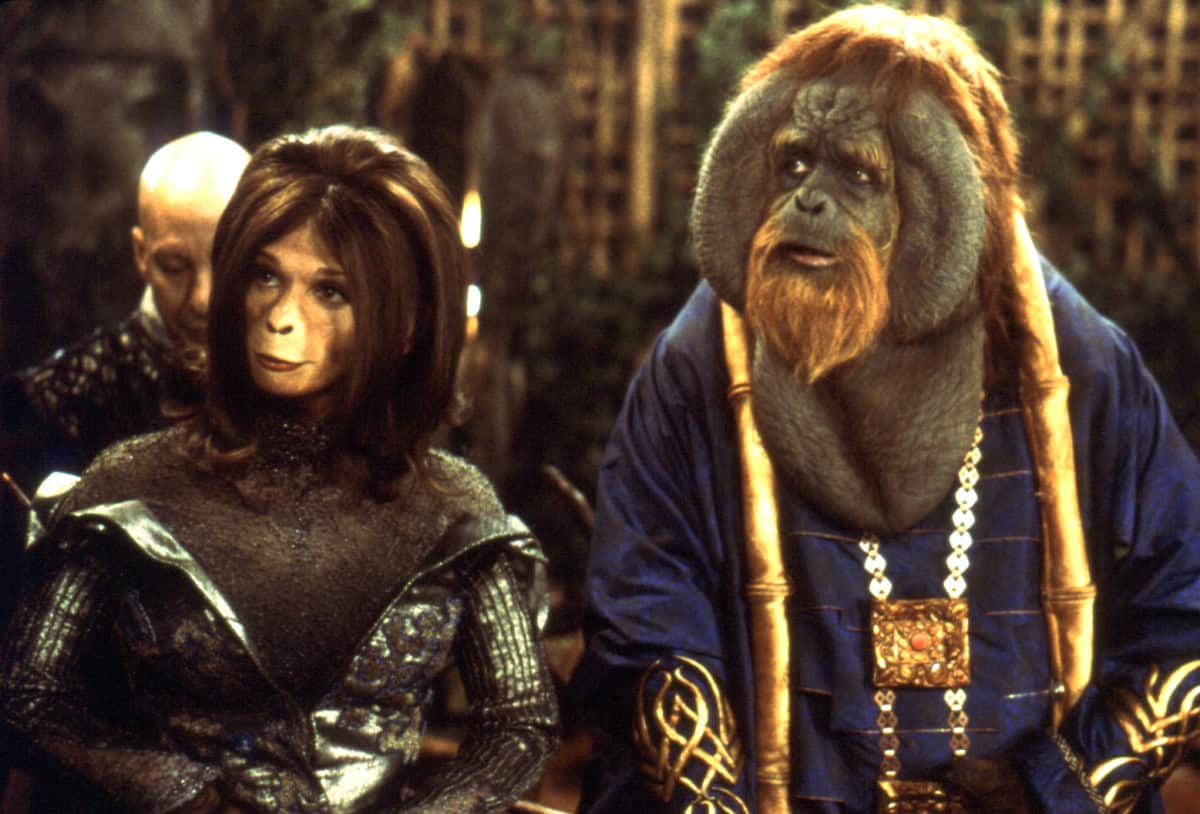“Planet of the Apes” (2001)

“Planet of the Apes,” directed by Tim Burton and released in 2001, is a reimagining of the classic science fiction film that explores themes of evolution, conflict, and identity within a visually stunning and thought-provoking narrative. Set in a future where humans and intelligent apes coexist in a fragile balance of power, the film follows Captain Leo Davidson, played by Mark Wahlberg, as he crash-lands on a mysterious planet ruled by a civilization of highly evolved apes. As Leo navigates this strange and hostile world, he uncovers shocking truths about its history, culture, and the precarious nature of human-Ape relations.
The narrative begins with Leo Davidson, an astronaut aboard a space station conducting research on primates, who is unexpectedly propelled into a wormhole and transported to an unfamiliar planet. Stranded in a world where apes dominate and humans are enslaved, Leo finds himself thrust into a conflict between the ruling chimpanzee General Thade, portrayed by Tim Roth, and the compassionate chimpanzee Ari, played by Helena Bonham Carter, who questions the injustices perpetuated against humans.

One of the film’s strengths lies in its exploration of themes of power, prejudice, and the consequences of unchecked technological advancement. Tim Burton’s direction and William Broyles Jr.’s screenplay delve into the complexities of societal hierarchy and the moral implications of treating sentient beings as inferior based on species. Through the contrasting perspectives of Leo, Ari, and General Thade, the film challenges viewers to reconsider notions of superiority and empathy in the face of oppression and cultural conflict.
Moreover, “Planet of the Apes” showcases groundbreaking makeup effects and visual design that bring its simian characters to life with striking realism and emotional depth. The intricate prosthetics and costumes, created by Rick Baker and his team, transform actors into convincing chimpanzees, gorillas, and orangutans, enhancing the film’s immersive world-building and character development. The film’s lush landscapes and dystopian cityscapes further underscore its exploration of a civilization where humans are marginalized and apes hold dominion over societal norms and technological innovation.

In addition to its visual spectacle, “Planet of the Apes” explores themes of identity and the search for belonging as Leo grapples with his role as an outsider thrust into a foreign and hostile environment. Mark Wahlberg’s portrayal of Leo captures his determination and resourcefulness in the face of adversity, while Helena Bonham Carter’s performance as Ari brings depth and empathy to her character’s struggle against ingrained prejudice and systemic injustice.
Furthermore, “Planet of the Apes” is celebrated for its philosophical inquiry into the nature of civilization and the potential consequences of exploiting natural resources and manipulating genetic evolution. The film’s climactic revelations challenge viewers to confront ethical dilemmas surrounding scientific experimentation and the ethical treatment of intelligent beings, prompting reflection on the fragility of coexistence and the pursuit of harmony between different species.

Critically acclaimed for its visual artistry, compelling performances, and thought-provoking narrative, “Planet of the Apes” received praise for Tim Burton’s visionary direction and the ensemble cast’s ability to breathe life into its diverse characters. The film’s ability to blend action-packed sequences with philosophical depth resonated with audiences, establishing it as a standout entry in the science fiction genre that honors the legacy of its source material while offering a fresh perspective on timeless themes.
In conclusion, “Planet of the Apes” (2001) stands as a visually arresting and thematically rich exploration of evolution, conflict, and identity in a world where humanity’s place is redefined by the ascendancy of intelligent apes. Through its captivating narrative, memorable characters, and striking visual effects, the film invites viewers to contemplate the ethical implications of societal hierarchies and the enduring quest for equality and understanding across species boundaries. As Leo Davidson navigates the complexities of a civilization turned upside down, “Planet of the Apes” remains a poignant reminder of the power of empathy and the unpredictable consequences of technological advancement.











